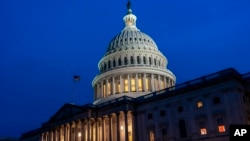A bipartisan group of 14 U.S. senators on Friday sent a letter to Georgian Prime Minister Irakli Kobakhidze expressing concern over his government’s decision to reintroduce and advance a "Russian-style foreign agents’ law" similar to one they were forced to withdraw a year ago.
The senators said they fear the decision is undermining Georgia’s European future and its relations with the U.S. They warned the prime minister that if the legislation becomes law, they would be compelled to encourage a shift in U.S. policy toward Georgia.
In the letter, obtained by the Voice of America shortly after it was sent to Kobakhidze, the senators called "on the government of Georgia to withdraw the law, which threatens U.S.-Georgia relations and also raises the possibility of imposing sanctions on individuals, cutting off direct government funding and expanding visa restrictions."
A day before the senators’ letter became public, the U.S. Helsinki Commission published a strongly worded statement, calling on the ruling Georgian Dream Party to withdraw the foreign agent bill and urging "Georgian authorities to divert from this destructive path."
The commission promotes human rights, military security, and economic cooperation in 57 countries in Europe, Eurasia, and North America. Its members come from the U.S. Senate, U.S. House and the executive branch.
The law would require any organization in Georgia receiving more than 20% of its funding from foreign sources to register as an organization representing a foreign interest. If they fail to register, they would face significant financial penalties.
Opposition and civil society groups say the proposed law is designed to silence the freedom of speech of Georgian citizens and organizations, including the activities of election monitors, by demonizing them as foreign agents, which in the post-Soviet context equates them to traitors.
Georgia will hold parliamentary elections in October.
The government says the law is equivalent to the U.S. Foreign Agents Registration Act, which requires U.S. citizens to register as foreign agents if they actively represent the interests of a foreign principal in the United States.
In their letter, the senators rejected the comparison.
"We must also make it clear that the reintroduced foreign agents’ law does not mirror any U.S. law and would be used to silence the civil society and media that play a significant role in advancing Georgia’s democratic institutions," they wrote.
The U.S. law bases such a foreign agent determination on the activities of U.S. individuals and organizations, and it explicitly creates exemptions for such things as education, cultural and scientific exchange. The Georgian law is based on a Russian law that labels any group or person a foreign agent based only on their funding.
The U.S. senators, echoing many high-ranking EU officials, said the bill targets civil society and appears directed at discrediting assistance from the United States and Europe in support of democracy.
Since Georgia’s independence in 1991, the U.S. and Europe have invested hundreds of millions of dollars to support Georgia’s sovereignty and democratic transition, the letter said.
If the bill is approved, the senators say it would cast Georgia’s strongest partners, the United States and European Union, "as malign actors" and "such a shift would require U.S. policy toward Georgia to change and reflect the new state of Georgia’s politics."
The U.S. and the EU have been strong supporters of Georgia’s democratic development for more than 30 years. Russia, however, invaded Georgia in 2008, and still occupies 20% of Georgian territory.
The EU extended candidate status for EU membership to Georgia in December after the government recalled the foreign agent law last year because of massive public protests.
Georgia is awaiting an EU decision to start accession talks with the bloc. If Georgia adopts this foreign agent bill as law, EU officials said, it will derail the country’s path to Europe.
The actions of the Georgian government to pass the "Putin-style law" as Senate Foreign Relations Committee Chairman Benjamin Cardin called it – despite massive street protests by Georgian citizens, particularly youths, and repeated warnings from the EU and the U.S. officials – have caused a dilemma for the supporters of Georgia’s integration into Europe.
Western supporters of Georgia do not want to push the country away from the EU and NATO because 80% of the Georgian public support membership in these institutions, yet they also do not want to overlook or condone such behavior by the government.
The letter, initiated by Senators Jeanne Shaheen, a senior Democratic member of the Foreign Relations Committee and chair of its Subcommittee on Europe and Regional Security Cooperation, and James Risch, the senior Republican on the full committee, was signed by 12 other senators and sent to Georgia’s Prime Minister Kobakhidze around 9 p.m. Friday in Tbilisi. Other senators signing the letter included Cardin, Lindsey Graham, Chris Coons, Pete Ricketts, Richard Durbin, Roger Wicker, Richard Blumenthal, Thom Tillis, Tim Kaine, Dan Sullivan, Sheldon Whitehouse and Martin Heinrich.





